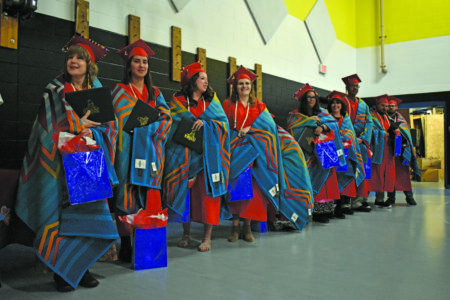80 march for abortion rights

Garrett Neese/Daily Mining Gazette Second-year Michigan Technological University student Kali Kater, left, walks during Saturday’s Women’s March in Houghton.
HOUGHTON — About 80 people marched across the Portage Lake Lift Bridge in support of abortion rights Saturday, joining protesters at more than 650 events in all 50 states and Washington, D.C.
“It’s important to do this locally to make a statement,” said march organizer Susan Burack. “We know that one out of four women will have an abortion in their lifetime, and we need to protect women’s right to choice. If women don’t have control of their bodies, they don’t have anything. I’ve been doing this for 50 years, and I want to see some progress.”
The fifth Women’s March, previously held in January, comes months after a new Texas law that effectively bans abortion after six weeks. In September, the U.S. Supreme Court declined to block the law from going into effect while it is appealed.
Texas argues the law does not conflict with Roe v. Wade, as it leaves enforcement up to individual citizens. Another case coming before the Supreme Court this fall challenges Roe v. Wade directly. A Mississippi law would bar abortions after 15 weeks — about two months sooner than is allowed under Roe.
Michelle Southerland of Laurium hoped the protests would convince the court to “hear our voice.”
“I have two young daughters,” she said. “I want to make sure any decisions they make regarding their reproductive choices are theirs and theirs alone. And the government has no business stepping into that.”
If Roe v. Wade is overturned, the legality of abortion would vary depending on the state. Twenty-six states have bans that pre-date Roe v. Wade or would take effect if the ruling is overturned.
In Michigan, a law passed in the 1930s makes performing or facilitating an abortion a felony unless the mother’s life is in danger. Attorney General Dana Nessel, who signed on with 22 other attorneys general to challenge the Texas law, has said she would not enforce the ban.
“If abortion had been safe and legal back in the ’60s, when I was a teenager, I would not have had to go to Mexico,” said Catherine Paavola, who grew up in the Detroit area.
Abortion should be treated like other healthcare issues, and be handled privately and personally, with good care available, said Paavola, who now lives in Pelkie.
Paavola’s sign — “If men had babies, abortion would be safe and legal” — resonated with Kali Kater. a second-year ecology and evolutionary biology student at Michigan Technological University. She found it telling that calls to ban abortion were not often accompanied by government programs to help mothers, such as universal pre-K child care and a $15 minimum wage.
“We still live in a very patriarchal society, and I think it’s disgusting that in 2021, we still have to protest this,” she said.
Saturday’s protests drew mostly favorable reactions from drivers on the bridge, including honks and thumbs up. The most notable detractor was a truck that made several passes across the bridge, blasting exhaust at the marchers.
A number of community groups helped organize Saturday’s protest, including Keweenaw Youth for Climate Action, League of Women Voters of the Copper Country, Rise UP Keweenaw Chapter and Michigan United.
“I think that every person has the right to choose, and I think the nationwide marches that are taking place today is one step to making sure Roe v. Wade is not overturned,” said Audrey Gerard, a healthcare organizer with Michigan United.




